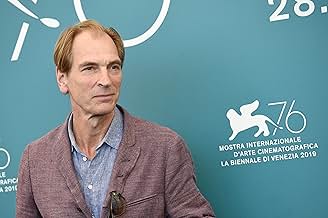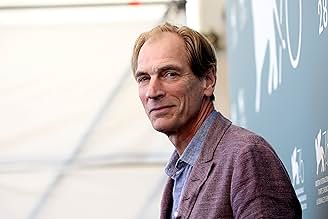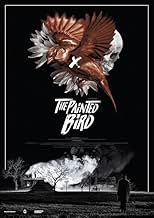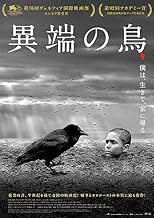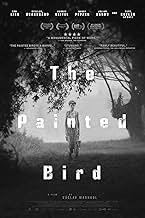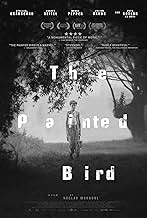NOTE IMDb
7,3/10
8,3 k
MA NOTE
En Europe de l'Est, un jeune garçon juif cherche refuge pendant la Seconde Guerre mondiale, où il rencontre de nombreux personnages différents.En Europe de l'Est, un jeune garçon juif cherche refuge pendant la Seconde Guerre mondiale, où il rencontre de nombreux personnages différents.En Europe de l'Est, un jeune garçon juif cherche refuge pendant la Seconde Guerre mondiale, où il rencontre de nombreux personnages différents.
- Réalisation
- Scénario
- Casting principal
- Récompenses
- 24 victoires et 24 nominations au total
Nina Sunevic
- Marta
- (as Nina Shunevych)
Marika Sarah Procházková
- Woman #1
- (as Marika Procházková)
Avis à la une
'The Painted Bird' (2019) by Czech director Václav Marhoul is a very difficult film to evaluate. On the one hand, from a cinematic point of view, it is one of the remarkable performances we have seen in recent years - impeccably technical, with many interesting innovations that serve the narrative and messages of the film. It is a film about the Holocaust, an inexhaustible historical and human theme, and more precisely about the destiny of a child in those terrible times - so a story of those with which viewers identify emotionally. Here, however, the issue of this construction also appears. The series of horrors that pervade the screen hardly coexists with the inevitable sensitivity of the spectators when it comes to children's fates on screen. The film is an indictment against a war-torn dehumanised Europe, cruel or at best indifferent to the fate of children separated from their parents by the brutality of war, witnesses and often even victims of the most terrible torture and abuse. There is a complicated history around the film, which adds complexity to the whole edifice and makes it even more difficult to appreciate this film which is both difficult to watch and impossible to ignore as cinematic value and message.
Joska, the main hero, is a Jewish boy on the verge of adolescence, maybe 10-11 years old, who is sent by his parents to an aunt living in a distant place to be saved from deportation. The aunt dies suddenly and the boy embarks alone on a journey home through war-torn Central Europe. On the way he will meet different people, traumatised and impoverished by war. Few will help him, most will exploit, hit, humiliate him. The horrors he will witness and the trials this boy goes through are extreme - from violence and slavery to torture, rape and sexual perversions. Almost the entire repertoire of human cruelty is present in this film. Under these conditions, the boy is in danger to lose his humanity, his sense of good and evil, his appreciation of the value of life, and his identity. Is it still possible for him to recover and return to a normal life after individual traumas of such intensity and proportions? The elliptically beautiful final leaves this question open.
The Europe described by Václav Marhoul contains enough historical hints that allow to locate the story in the film in time in 1944-1945, the last years of World War II, but at the same time many of the scenes take place in a rural setting that could belong to any of the historical periods when Europe was torn apart by wars from the Middle Ages to the present day. Geographical area is treated similarly. The novel that inspired the film is written (in English) by the Polish Jerzy Kosinski, but the producers of 'The Painted Bird' made efforts to avoid a precise location, up to inventing a hybrid language that is used by the villagers in the film, language which combines Czech, Slovak and Polish spoken in central Europe. The cinematography signed by Vladimír Smutný is remarkable, using aesthetically and expressively black and white and the widescreen format of some of Ingmar Bergman's famous films. Much of the film's burden lies on the shoulders of child actor Petr Kotlár, who does not say a word throughout the film, but whose eyes are witnesses to the horrors outside and the suffering inside. The rest of the cast includes a consistent series of portraits, very well made, with realism and naturalism, and played mostly by Czech actors whom we do not know, but also with a few exceptions of celebrities such as Stellan Skarsgård or Harvey Keitel, excellently integrated. As in the masters' films, 'The Painted Bird' is divided into episodes, each bearing the names of some of the human or inhuman people that Joska encounters on his way. Kosinski's novel aroused controversy similar to that now aroused by the film, due to the accumulation of extreme scenes of violence and sex, but also because what was originally presented and promoted as an autobiographical story proved to be rather a synthesis of stories, gathered disparately from the testimonies of several survivors who lived the Holocaust in childhood. In a world where direct witnesses are almost non-existent and where deniers are making their voices heard louder and louder, even works of fiction such as the book and film 'The Painted Bird' must be credible. It is not the description of the extremes that seems problematic to me, but rather their gathering in a single biography. Lack of credibility also harms the emotional involvement of viewers. The temporal and geographical generalisation introduced in the film solves, I think, only partially this problem.
Joska, the main hero, is a Jewish boy on the verge of adolescence, maybe 10-11 years old, who is sent by his parents to an aunt living in a distant place to be saved from deportation. The aunt dies suddenly and the boy embarks alone on a journey home through war-torn Central Europe. On the way he will meet different people, traumatised and impoverished by war. Few will help him, most will exploit, hit, humiliate him. The horrors he will witness and the trials this boy goes through are extreme - from violence and slavery to torture, rape and sexual perversions. Almost the entire repertoire of human cruelty is present in this film. Under these conditions, the boy is in danger to lose his humanity, his sense of good and evil, his appreciation of the value of life, and his identity. Is it still possible for him to recover and return to a normal life after individual traumas of such intensity and proportions? The elliptically beautiful final leaves this question open.
The Europe described by Václav Marhoul contains enough historical hints that allow to locate the story in the film in time in 1944-1945, the last years of World War II, but at the same time many of the scenes take place in a rural setting that could belong to any of the historical periods when Europe was torn apart by wars from the Middle Ages to the present day. Geographical area is treated similarly. The novel that inspired the film is written (in English) by the Polish Jerzy Kosinski, but the producers of 'The Painted Bird' made efforts to avoid a precise location, up to inventing a hybrid language that is used by the villagers in the film, language which combines Czech, Slovak and Polish spoken in central Europe. The cinematography signed by Vladimír Smutný is remarkable, using aesthetically and expressively black and white and the widescreen format of some of Ingmar Bergman's famous films. Much of the film's burden lies on the shoulders of child actor Petr Kotlár, who does not say a word throughout the film, but whose eyes are witnesses to the horrors outside and the suffering inside. The rest of the cast includes a consistent series of portraits, very well made, with realism and naturalism, and played mostly by Czech actors whom we do not know, but also with a few exceptions of celebrities such as Stellan Skarsgård or Harvey Keitel, excellently integrated. As in the masters' films, 'The Painted Bird' is divided into episodes, each bearing the names of some of the human or inhuman people that Joska encounters on his way. Kosinski's novel aroused controversy similar to that now aroused by the film, due to the accumulation of extreme scenes of violence and sex, but also because what was originally presented and promoted as an autobiographical story proved to be rather a synthesis of stories, gathered disparately from the testimonies of several survivors who lived the Holocaust in childhood. In a world where direct witnesses are almost non-existent and where deniers are making their voices heard louder and louder, even works of fiction such as the book and film 'The Painted Bird' must be credible. It is not the description of the extremes that seems problematic to me, but rather their gathering in a single biography. Lack of credibility also harms the emotional involvement of viewers. The temporal and geographical generalisation introduced in the film solves, I think, only partially this problem.
I am totally blown away by the sensitivities of audiences that go see Marvel movies where everything is blown up and destroyed and that's exciting but when a real art film comes out and it shows rapes other things that are difficult to watch but important to the plot and it's freak out time Because of this so-called PC correctness acting is forgotten everything is real and it's not it's not real it's made to look real so that you understand what the director and perhaps the screen writer and author is trying to say this is not a holocaust film per se the author did not even intend it to be 100% that it's a film depicting how life can unfurl in certain times of bleak history and how that can actually rebirth into a tale of man's every day existence The "violence" is necessary to relate the story.
To be honest I had my doubts about this movie before watching it. A Czech black and white movie that is almost three hours long, it didn't look appealing to me, but after watching it I'm glad to admit I was wrong having those prejudices. The cinematography is stunning, certainly one of the best black and white movies I ever watched. Every shot is well thought of, beautiful work with the contrasts and shadows, dark images that fit perfectly with the very hard story. I get it that some viewers will hate it, it's not an easy movie to watch and not everybody is able to digest some of the brutal scenes. Personally I wasn't really bothered by it, it's just a movie, and those images contributed perfectly to the story. It's a story about constant abuse, the hard reality for some kids, whether you like it or not the war wasn't a nice period to live in, certainly not for a Jewish abandoned kid. Petr Kotlár did a stunning job playing his character, and even if there's not much talking in The Painted Bird you still get drawn into the story, mostly due to the excellent cinematography but also because of that very well chosen cast. Most of the actors are unknown to me, most of them look like they had a hard life (it changes from the usual goodlooking Hollywood actors we're normally bombarded with). Their faces showed the despair, the anger, the evil that was present in every character. If you watch this movie you will come to the conclusion there are no nice people in The Painted Bird. Beside the unknown cast I was surprised to see some very well known actors like Harvey Keitel, Stellan Skarsgård and others. They had smaller roles but were effective, and even if I doubt Harvey Keitel manages to speak Czech it looked all natural. The Painted Bird was a nice surprise to me, never expected that, but it's certainly not for everybody as the cruelty drips from every scene in this movie.
It's an eastern european movie at its core: raw, uncompromising, brutal, dim, hopeless and honest.
Brutality actually lead to several people leaving the screening I attended to at Venice 76. Here, this movie was labeled as '14+' but I believe it can be easily rated NC-17. The brutality of this movie includes some very graphic gore (although it's mostly present in the first half of the movie) and sexual-related violence (mostly implied but persistent throughout the film). I believe that, as of on-screen depiction of violence, this film probably outranks Schindler's List (although It isn't as vast scaled as Spielberg's film).
Stylistically, this film uses mostly the visual medium rather than conversations to provide information to the viewer. Dialogue becomes secondary at a point where the main character maybe utters a couple of lines throughout the movie, and some of the characters he meets with are entirely silent (Skasgard's character, for example).
The film has a very precise structure: it is made up of 8 chapters, each entitled after a character that the kid meets with, and each chapter reaches a moment when the screen fades to black. After that, a sort-of connective sequence displays the events that lead the kid to change his whereabouts. Among the characters he meets, the audience might recognize Alexander Skasgard, but also Harvey Keitel (in an entirely czech-speaking role) as well as Barry Pepper and german actor Udo Kier.
I wouldn't say that The Painted Bird is a holocaust or ww2 movie, or better, it isn't only that. Thematic elements that relate to either the Holocaust or the War, with the exception of a german plane seen early on, come up only after around one hour in-movie. Before that, whatever happens is mostly related to a strongly rural and superstitious society.
The Painted Bird pays implicit homage to several Eastern European films. The opening sequence mimics the one seen in Jan Nemec's "Diamonds of the Night", a lot of settings remind Elem Klimov's "Come and See" and Tarkovsky's "Ivan's Childhood", the overall fatalist tone reminds strongly of Bela Tarr's films.
It is an outstanding accomplishment, and I sincerely hope that this movie, despite its graphic content, receives enough recognition.
Brutality actually lead to several people leaving the screening I attended to at Venice 76. Here, this movie was labeled as '14+' but I believe it can be easily rated NC-17. The brutality of this movie includes some very graphic gore (although it's mostly present in the first half of the movie) and sexual-related violence (mostly implied but persistent throughout the film). I believe that, as of on-screen depiction of violence, this film probably outranks Schindler's List (although It isn't as vast scaled as Spielberg's film).
Stylistically, this film uses mostly the visual medium rather than conversations to provide information to the viewer. Dialogue becomes secondary at a point where the main character maybe utters a couple of lines throughout the movie, and some of the characters he meets with are entirely silent (Skasgard's character, for example).
The film has a very precise structure: it is made up of 8 chapters, each entitled after a character that the kid meets with, and each chapter reaches a moment when the screen fades to black. After that, a sort-of connective sequence displays the events that lead the kid to change his whereabouts. Among the characters he meets, the audience might recognize Alexander Skasgard, but also Harvey Keitel (in an entirely czech-speaking role) as well as Barry Pepper and german actor Udo Kier.
I wouldn't say that The Painted Bird is a holocaust or ww2 movie, or better, it isn't only that. Thematic elements that relate to either the Holocaust or the War, with the exception of a german plane seen early on, come up only after around one hour in-movie. Before that, whatever happens is mostly related to a strongly rural and superstitious society.
The Painted Bird pays implicit homage to several Eastern European films. The opening sequence mimics the one seen in Jan Nemec's "Diamonds of the Night", a lot of settings remind Elem Klimov's "Come and See" and Tarkovsky's "Ivan's Childhood", the overall fatalist tone reminds strongly of Bela Tarr's films.
It is an outstanding accomplishment, and I sincerely hope that this movie, despite its graphic content, receives enough recognition.
A young Jewish boy and the extreme abuse (quite hideous, alarming at times) and suffering inflicted upon him during WWII by some exceptionally evil and wicked people; slightly loses traction with a few too many frying pan fire cycles to emphasise the point, a shocking experience nonetheless, albeit a very long one. Whether the world still needs this kind of stylisation of the effects of war remains debatable, as does its impact on the memories and emotions already formed over so many years and by so many.
Le saviez-vous
- AnecdotesIn the 1960s, writer Jerzy Kosinski had become famous in Manhattan literary circles for his astonishing tales about the brutalities he had allegedly suffered during the Second World War. Abandoned by his parents at the age of six, he claimed he had roamed the countryside alone, witnessing rape, murder, and incest, constantly fearing for his life. Kosinski turned those stories into his first novel, "The Painted Bird", which, for a time, was considered a major work of Holocaust literature. Kosinski's claims were later debunked when it was revealed that he and his parents had all been sheltered by religious Poles who had never handed him over to the Nazis.
- GaffesAfter the old man died, Lubina rolled him face down in his grave. The next shot he lies face up.
- ConnexionsFeatured in CT na MFF Karlovy Vary 2019: Nabarvené ptáce (2019)
- Bandes originalesFür Elise
Music by Ludwig van Beethoven
Meilleurs choix
Connectez-vous pour évaluer et suivre la liste de favoris afin de recevoir des recommandations personnalisées
- How long is The Painted Bird?Alimenté par Alexa
Détails
- Date de sortie
- Pays d’origine
- Sites officiels
- Langues
- Aussi connu sous le nom de
- The Painted Bird
- Lieux de tournage
- Sociétés de production
- Voir plus de crédits d'entreprise sur IMDbPro
Box-office
- Budget
- 175 000 000 CZK (estimé)
- Montant brut aux États-Unis et au Canada
- 1 460 $US
- Week-end de sortie aux États-Unis et au Canada
- 452 $US
- 19 juil. 2020
- Montant brut mondial
- 659 535 $US
- Durée2 heures 49 minutes
- Couleur
- Mixage
- Rapport de forme
- 2.39 : 1
Contribuer à cette page
Suggérer une modification ou ajouter du contenu manquant

Lacune principale
What is the streaming release date of L'oiseau bariolé (2019) in Australia?
Répondre



